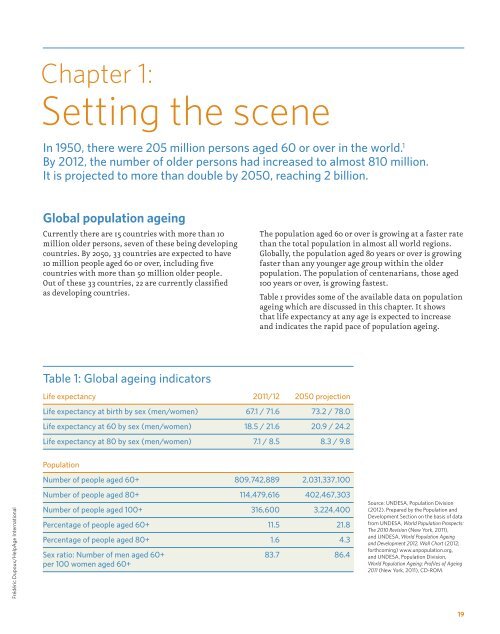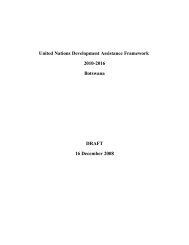Ageing in the Twenty-First Century: - HelpAge International
Ageing in the Twenty-First Century: - HelpAge International
Ageing in the Twenty-First Century: - HelpAge International
Create successful ePaper yourself
Turn your PDF publications into a flip-book with our unique Google optimized e-Paper software.
Chapter 1:<br />
Sett<strong>in</strong>g <strong>the</strong> scene<br />
In 1950, <strong>the</strong>re were 205 million persons aged 60 or over <strong>in</strong> <strong>the</strong> world. 1<br />
By 2012, <strong>the</strong> number of older persons had <strong>in</strong>creased to almost 810 million.<br />
It is projected to more than double by 2050, reach<strong>in</strong>g 2 billion.<br />
Global population age<strong>in</strong>g<br />
Currently <strong>the</strong>re are 15 countries with more than 10<br />
million older persons, seven of <strong>the</strong>se be<strong>in</strong>g develop<strong>in</strong>g<br />
countries. By 2050, 33 countries are expected to have<br />
10 million people aged 60 or over, <strong>in</strong>clud<strong>in</strong>g five<br />
countries with more than 50 million older people.<br />
Out of <strong>the</strong>se 33 countries, 22 are currently classified<br />
as develop<strong>in</strong>g countries.<br />
The population aged 60 or over is grow<strong>in</strong>g at a faster rate<br />
than <strong>the</strong> total population <strong>in</strong> almost all world regions.<br />
Globally, <strong>the</strong> population aged 80 years or over is grow<strong>in</strong>g<br />
faster than any younger age group with<strong>in</strong> <strong>the</strong> older<br />
population. The population of centenarians, those aged<br />
100 years or over, is grow<strong>in</strong>g fastest.<br />
Table 1 provides some of <strong>the</strong> available data on population<br />
age<strong>in</strong>g which are discussed <strong>in</strong> this chapter. It shows<br />
that life expectancy at any age is expected to <strong>in</strong>crease<br />
and <strong>in</strong>dicates <strong>the</strong> rapid pace of population age<strong>in</strong>g.<br />
Table 1: Global age<strong>in</strong>g <strong>in</strong>dicators<br />
Life expectancy 2011/12 2050 projection<br />
Life expectancy at birth by sex (men/women) 67.1 / 71.6 73.2 / 78.0<br />
Life expectancy at 60 by sex (men/women) 18.5 / 21.6 20.9 / 24.2<br />
Life expectancy at 80 by sex (men/women) 7.1 / 8.5 8.3 / 9.8<br />
Frédéric Dupoux/<strong>HelpAge</strong> <strong>International</strong><br />
Population<br />
Number of people aged 60+ 809,742,889 2,031,337,100<br />
Number of people aged 80+ 114,479,616 402,467,303<br />
Number of people aged 100+ 316,600 3,224,400<br />
Percentage of people aged 60+ 11.5 21.8<br />
Percentage of people aged 80+ 1.6 4.3<br />
Sex ratio: Number of men aged 60+ 83.7 86.4<br />
per 100 women aged 60+<br />
Source: UNDESA, Population Division<br />
(2012). Prepared by <strong>the</strong> Population and<br />
Development Section on <strong>the</strong> basis of data<br />
from UNDESA, World Population Prospects:<br />
The 2010 Revision (New York, 2011),<br />
and UNDESA, World Population <strong>Age<strong>in</strong>g</strong><br />
and Development 2012, Wall Chart (2012;<br />
forthcom<strong>in</strong>g) www.unpopulation.org,<br />
and UNDESA, Population Division,<br />
World Population <strong>Age<strong>in</strong>g</strong>: Profiles of <strong>Age<strong>in</strong>g</strong><br />
2011 (New York, 2011), CD-ROM.<br />
19







